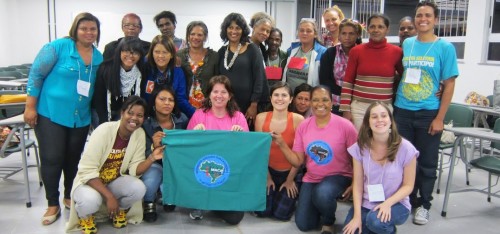
Women waste pickers of Minas Gerais, Brazil, discuss gender
Trabalhar o empoderamento das mulheres não implica exclusão dos homens, significa contribuir para a emancipação de todos, homens e mulheres.

Trabalhar o empoderamento das mulheres não implica exclusão dos homens, significa contribuir para a emancipação de todos, homens e mulheres.

El Día Mundial del Reciclaje los recicladores de Bogotá fueran a las calles para defender la dignidad y el trabajo y las conquistas, exigiendo respeto a la categoría.

In April, officials from the South African Department of the Environment were in Brazil and Colombia to learn about inclusive solid waste management. They visited waste pickers’ movements and cooperatives and spoke with NGOs and city officials. “We are particularly encouraged by the participatory aspects. This is something that resonates with South Africans,” Cobbinah said.

In the beginning of April of this year, officials from the South African Department of the Environment (chemical and waste management branches) were in Brazil and Colombia to learn about inclusive solid waste management.

Here is a video of the Goldman Prize acceptance speech of Nohra Padilla, informal recycler and leader of the Colombian waste pickers’ movement. As part of the Goldman Prize, Padilla and other supporters of inclusive waste management (including the director of the Bogotá solid waste management department) were taken on a tour of San Francisco’s Zero Waste program. See the gallery of photos in this post. Also, Nohra Padilla is also scheduled to meet with President Obama. More on that soon!
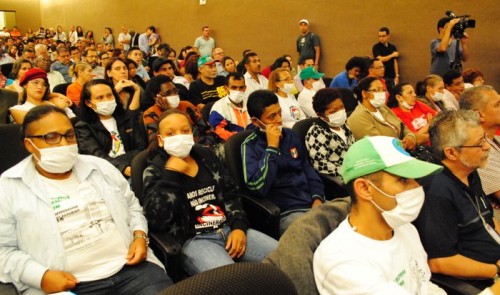
In Brazil, the fight against incineration continues. In São Bernardo do Campo, waste pickers attended public debate about waste to energy between the municipal government and the Anti-Incineration Coalition held at a Methodist church in the city. São Bernardo plans to install an incinerator that will burn waste in surrounding cities for a period of at least 30 years.
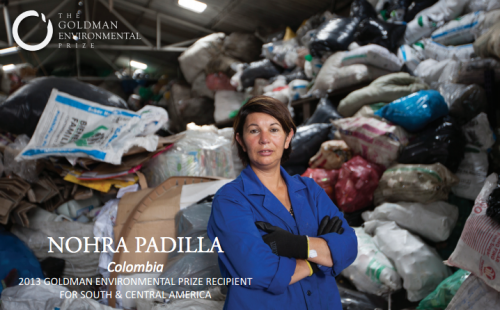
Congratulations, Nohra Padilla, informal recycler and leader with the Association of Recyclers of Bogotá and the National Association of Recyclers in Colombia, for winning today the Goldman Environmental Prize for South and Central America. This prize has been called the environmental “Nobel” or “Oscar”. It comes with a $150,000 cash award.
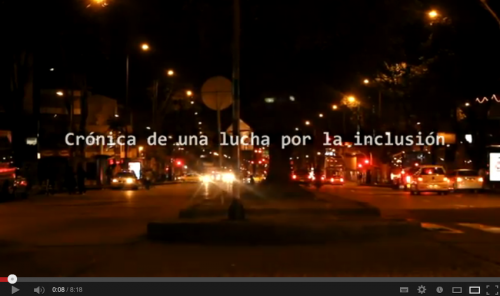
“Chronicle of a Fight for Inclusion: The December 2012 garbage crisis of Bogotá” (now with English subtitles) shows organized waste pickers promptly taking actions to reduce the impact of the garbage crisis in Bogota and giving an account of the series of unfortunate events and bad decisions that led to it, and of their struggles and victories throughout time to secure their rights and livelihoods. In doing so, they demonstrate their capacity to provide efficient and quality services to the city’s waste management system.
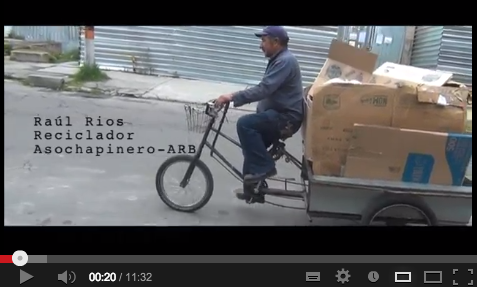
This video discusses Auto 275, a Bogotá law meant to protect waste pickers’ rights as public service providers and to guarantee payment. It led to the court order that resulted in the organized waste pickers of Bogotá receiving priority as service providers and receiving payment for the first time. Auto 275 is explained via interviews conducted by a Bogotá waste picker with government authorities. The version with English subtitles is coming soon!
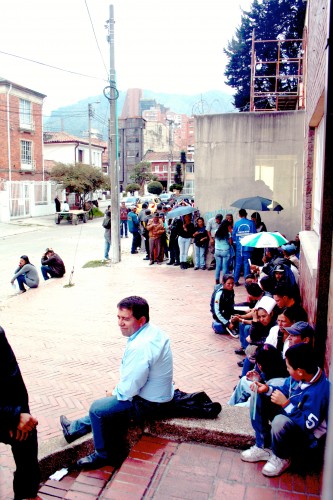
After over 20 years of fighting for recognition and inclusion in the city’s waste management system, the organized waste pickers of Bogotá finally saw their dreams come true when the municipal government issued them in March their first payment for the collection and transportation of recyclable materials. It was the first time they were paid as public service providers to the city.

Today, March 12, 2013, 250 waste pickers, mostly members of the ARB, received from the Mayor, the “PIN” or banking system, through which the Mayor is going to grant payment for the tons transported since December 2012.

Algunas imágenes de nuestros eventos en este 1 de marzo 2013 en Bogotá!

Today is a very special day for the people that day after day get up to give their best in our struggles, each and every one of the waste pickers in the region, from different countries.
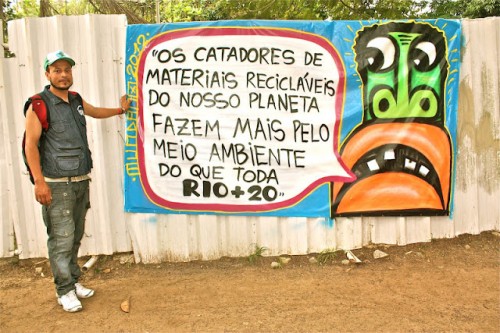
Today is still very far from being the day of happiness which all human beings yearn for, but certainly, bringing to light and to memory the tragic events that happened 26 years ago makes us reflect better on where we are today.
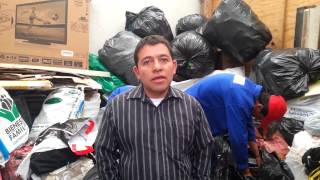
In the name of the National Association of Waste Pickers of Colombia, we would like to send you special greetings and blessings and a big hug.
On January 1, a fire broke out in the municipal landfill of León, Nicaragua. According to Red Lacre, bad management by the municipal government and Cielo Group, the company responsible for the landfill’s operations, was the cause of the fire.
In December, Sujeylin Isabel Ordoñez Quesada, a waste picker with “Cooperativa de Recuperadores del Pacifico R.L (COOPEREPA)” of Costa Rica, sent an email to Red Lacre (Latin American Network of Waste Pickers) requesting advice about what actions to take in regards to the closure of the Parque Ambiental de Garabito landfill and the likely loss of the livelihoods of the 18 families working there.

The Global Alliance for Incinerator Alternatives (GAIA) and Revuelta Verde recently released a report on the struggle against waste incineration in cement factories in Mexico. The United Nations´ Clean Development Mechanism (carbon trading scheme) could approve a proposal for a UK-based company to incinerate waste in a cement kiln in Huichapan

“Chronicles of a struggle for inclusion: The December 2012 garbage crisis of Bogota” shows organized waste pickers promptly taking actions to reduce the impact of the garbage crisis in Bogota and giving an account of the series of unfortunate events and bad decisions that led to it, and of their struggles and victories throughout time to secure their rights and livelihoods.
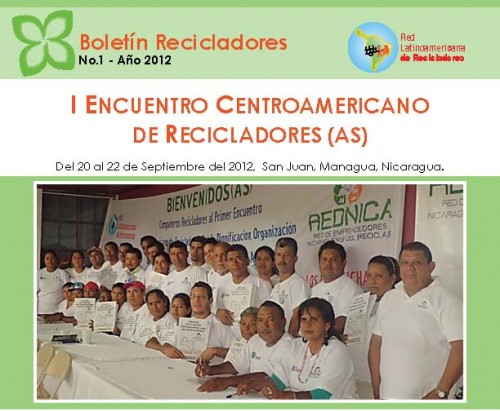
Download the first BOLETIN RECICLADORES of the Latin American Network of Waste Pickers (Red Lacre). You can read the most recent news aggregations Boliva, Brazil, Nicaragua, Chile, Uruguay, Honduras, and many others.